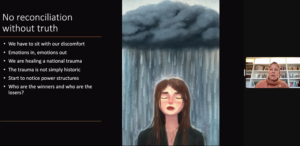Anishinaabe lawyer stresses importance of allies on the path to truth and reconciliation
Trigger warning: readers may be triggered by the recount of Indian Residential Schools. To access a 24-hour National Crisis Line, call: 1-866-925-4419. Community Assistance Program (CAP) can be accessed for citizens of the Anishinabek Nation: 1-800-663-1142

By Rick Garrick
THUNDER BAY — Biigtigong Nishnaabeg lawyer Nicole Richmond stressed the continuing impacts of Indian Residential Schools during her Understanding the Role for Allies in Reconciliation virtual Lakehead University presentation on Sept. 20.
“When we discovered the [potential] unmarked graves [last year], that was extremely traumatic and I think that sort of shook our nation,” Richmond says. “I remember not really quite knowing what to do with myself because hearing about the [potential] unmarked graves brought up my own trauma, hearing about all these terrible things that had happened to these students and the way they had died. One grave at a school is too much, in my opinion, and we’re finding thousands of [potential] unmarked graves.”
Richmond adds that Thunder Bay is home to the River of Tears, where the bodies of some of the seven First Nations high school students from remote fly-in First Nations whose deaths were examined during the Seven Youth Inquest were discovered.
“I feel sad about the fact that this is the structural reality that has been created by policies and procedures and assimilation and colonialism,” Richmond says, noting that the students died while pursuing their high school studies in Thunder Bay. “And the fact that Anishinaabe people are still here is miraculous, it is not a sad story, it is a story of survivorship, the fact that we are still here is amazing, it’s a story of resiliency.”
Richmond says there cannot be reconciliation without truth.
“When we’re healing, we have to feel the emotions, it’s not just this intellectual exercise where we go: ‘Oh yeah, kids were taken, terrible things happened, oh yeah at St. Anne’s [Residential School] they were using an electric chair, that’s really sad,’” Richmond says. “If we’re going to integrate this into our consciousness, we have to feel it, we have to feel sorrow, we have to sit with this sadness and sometimes that’s really challenging — the trauma is not historic.”
Richmond says the first step for an ally is to recognize they are privileged.
“The second step is you choose to stand for marginalized communities,” Richmond says. “The idea is you take tangible ongoing action to dismantle systems of oppression.”
Richmond says her yoga teacher is an ally, noting that she had to take a critical look at her own privilege, her own benefits and the things she grew up taking for granted in order to get to her position of allyship.
“We do need allies, Indigenous people are a population minority, we need allies because we need everyone to understand the history of the settlement of Canada and the way the structures have been set up,” Richmond says. “We know the colonial legacy’s impacts are ongoing, they’re traumatic, they’re with us today and we’re still trying to figure out how to deal with these legacies and to figure out what the impacts are. I’m really concerned about healing and what does healing look like.”
Richmond encourages allies to learn the facts.
“You’re not responsible for the cultural stuff, let us take care of that,” Richmond says. “But you can learn the history and you can teach the history. If you need resource material, anytime I see Murray Sinclair on YouTube I learn so much, he’s a great resource person.”
Richmond says the role for allies is to understand their privilege, to tell the truth, to tell their friends who also have privilege what that privilege looks like and to help people understand.
“When we’re sort of raising our collective consciousness or our awareness, that’s how things really start to change,” Richmond says.

